Title
- Length on par and reasonable for research studies;
- Clearly lays out the topic without adding unnecessary information;
- Key concept terms on topic “experiences” and “posttraumatic” present but not mentioning methods;
- Very specific such as “military” and “combat-related” focusing the topic;
- Keywords clear in the title contributing to searchability;
- The studied population mentioned directly “spouses of veterans” (Yambo et al., 2016).
Overall, the title is very direct and concise, outlining the topic and population. It does not mention the type of study or methodology in the title, but that is not necessarily expected. However, the title provides a clear outline of what the research paper will be about and does not seek to be overall technical or ‘catchy’ title. It is highly appropriate for a clinical study scholarly article.
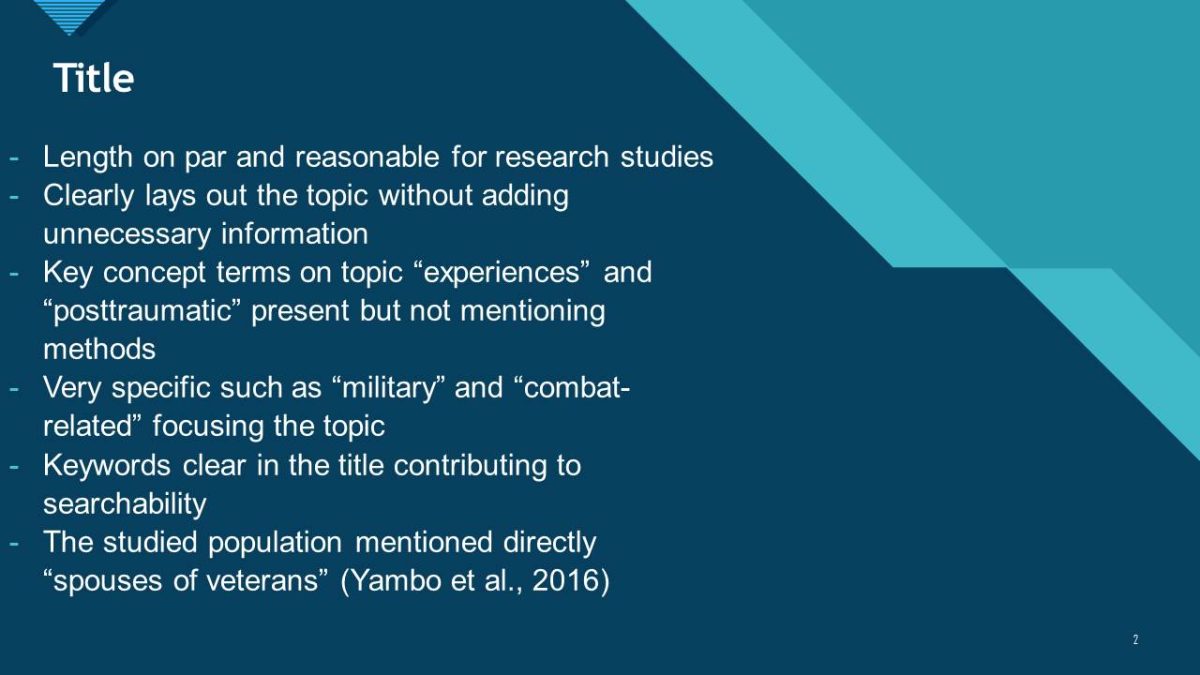
Abstract
- Follows informative (complete) abstract design;
- Informative abstracts are expert-oriented, specifically laying out contents of the paper (“Types of abstracts”, n.d.);
- Purpose stated, largely just clarifying some aspects of the title;
- Summary of results is present through findings and conclusions;
- Notably, clinical relevance is present which is rare to see in abstracts.
The abstract is well-structured through the informative design which is easy for the reader to scan and identify key pieces of information. Brief descriptions are present for each element of the study with key details. The fundamental concepts, methodologies, and outcomes of the study are present and clearly stated in the abstract. It is easy to read and does not delve into technicalities. The presence of clinical relevance is helpful in identifying whether this study could be useful for clinical guidance or research.
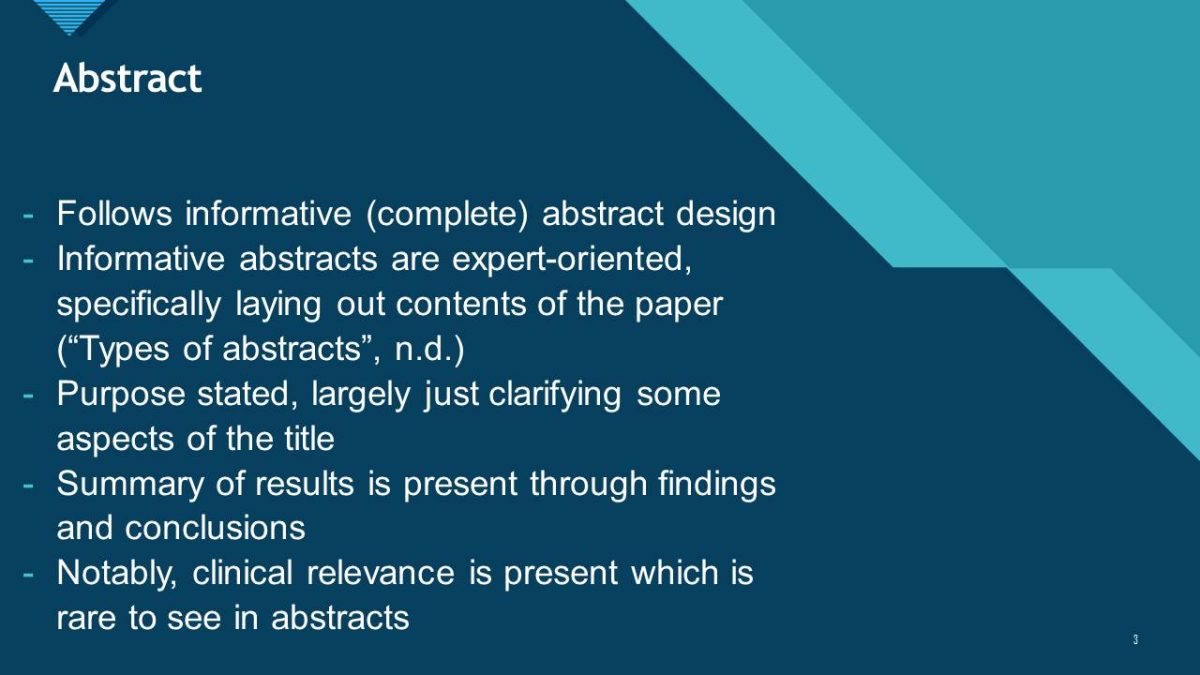
Introduction
- The problem statement is not clearly identified;
- Introduction mentions some of the problems which the study is meant to address;
- Focus on negative impact on “military families impacted by PTSD” and filling the “gap in knowledge” (Yambo et al., 2016);
- Importance to nursing specifically not discussed – rather mental health practitioners, international clinicians and researchers in the field;
- Introduction presents vital information but lacks some clear structure.
The introduction to the article sets up the research well in terms of outlining the topic, defining some key concepts and terms, and emphasizing the importance of this research. It is easy to follow, but seemingly lacks some structure. There is no problem statement directly, but it does state a purpose and importance to clinical practice.
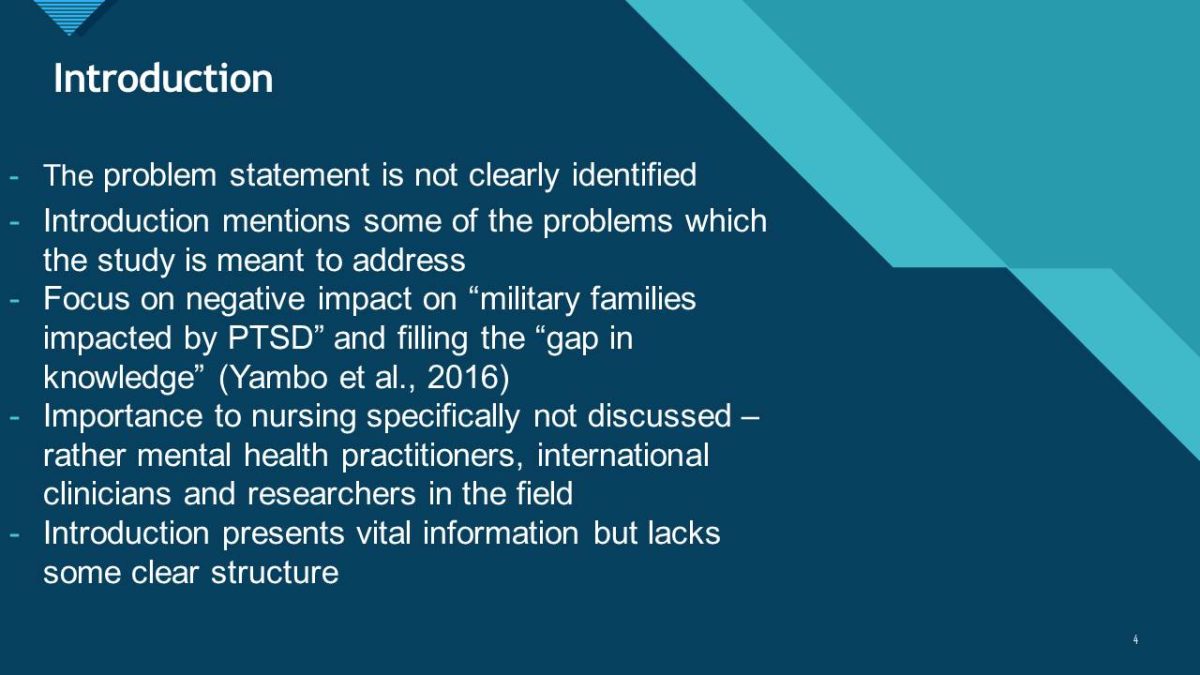
Literature Review
- Literature review present but brief and labeled as ‘background’;
- Review divided into empirical data and philosophical framework – very helpful;
- Data comes from primary sources such as health organizations – mostly recent within 1-2 years of publication;
- Framework and supporting information originate from secondary sources – majority outdated, some close to or older than 10 years from publication;
- Review is summary of work and concepts and does not seek to compare or evaluate the sources in any manner.
The literature review for this study is very brief, with a significant background already established in the introduction. However the decision to split the review into a data section (containing empirical data, symptoms of PTSD) and the philosophical framework element was highly beneficial as it allowed to differentiate easily between the theoretical elements driving the research and then the data which was also evidence to support it. Sources are all academic or from leading health organizations so there is no question of validity, but the use of a significant number of outdated sources and the lack of the authors to critically evaluate them, focusing strongly on summary, is concerning.
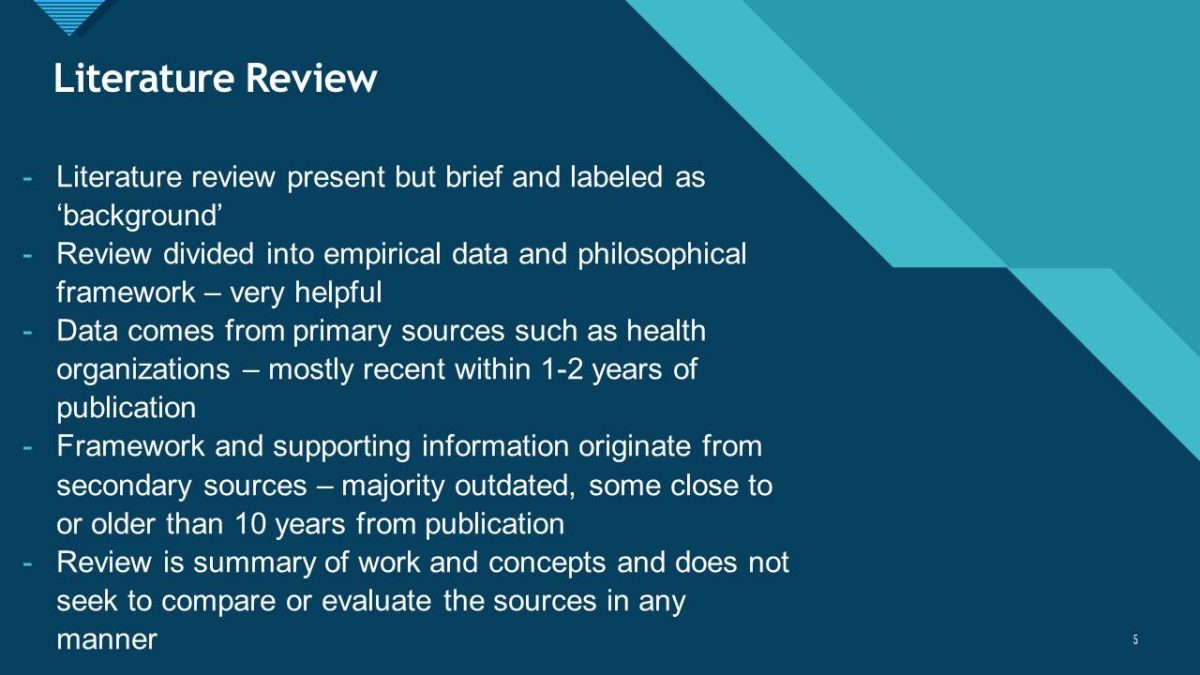
Methods
- Data collection took place until redundancy and data saturation was achieved;
- Interviews were the primary method of data collection – 2 conducted via telephone;
- Written informed consent given by participants;
- Review board of Rush University approved the study;
- Participants were protected to preserve confidentiality and assigned aliases.
The study follows standard qualitative methods for interviews. One notable aspect is that interview questions are not discussed. All consent, permissions are obtained, and proper measures are taken for confidentiality. In terms of these administrative elements the researchers did really well. In terms of data collection however it is unclear why the researchers believed that data saturation was achieved after just 14 interviews.
- Interviews were conducted individually with participants, most in-person;
- Interviews were unstructured with open-ended questions;
- Researchers sought to probe participants to clarify certain issues;
- Interviews were audiotaped, transcribed, and field notes were written;
- The method matches the design of the study;
- Experiences can be accurately described through guided narrative of an interview.
The data collection method of unstructured interviews was the proper choice for this qualitative study as it is the best method of direct data collection on such broad psychological and behavioral elements that the topic encompasses. As later analysis shows, the researchers were able to properly reiterate the participant’s experiences in their descriptions, thus contributing to the identification of common themes among these spouses of veterans.
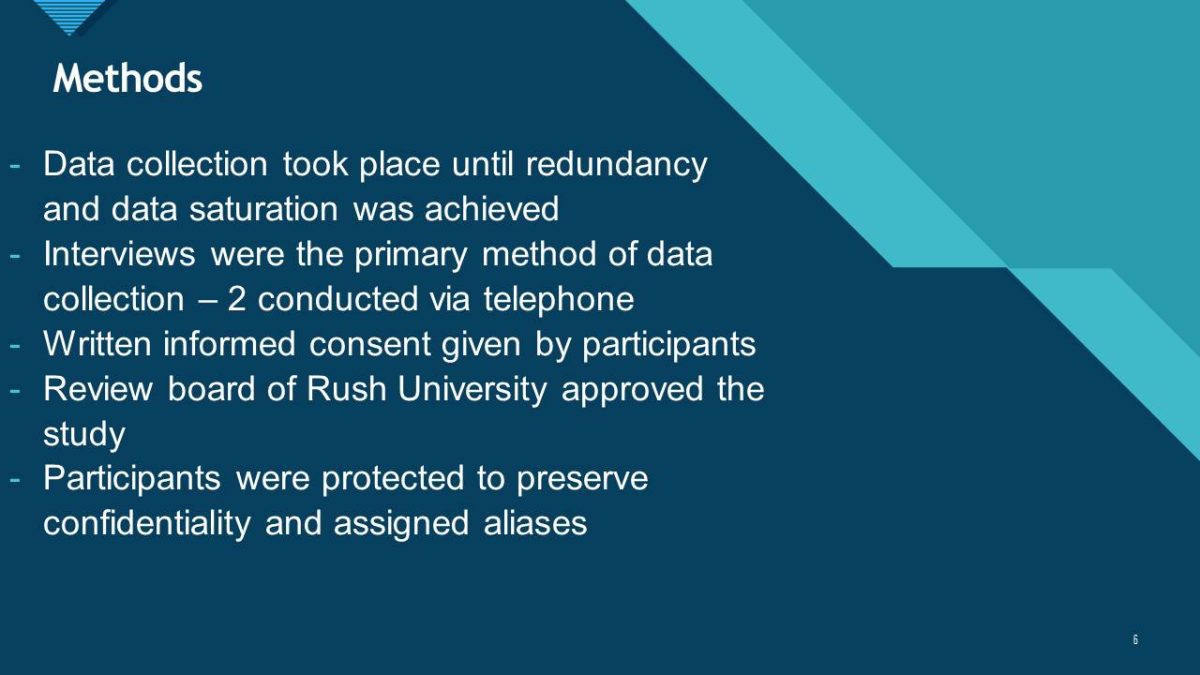
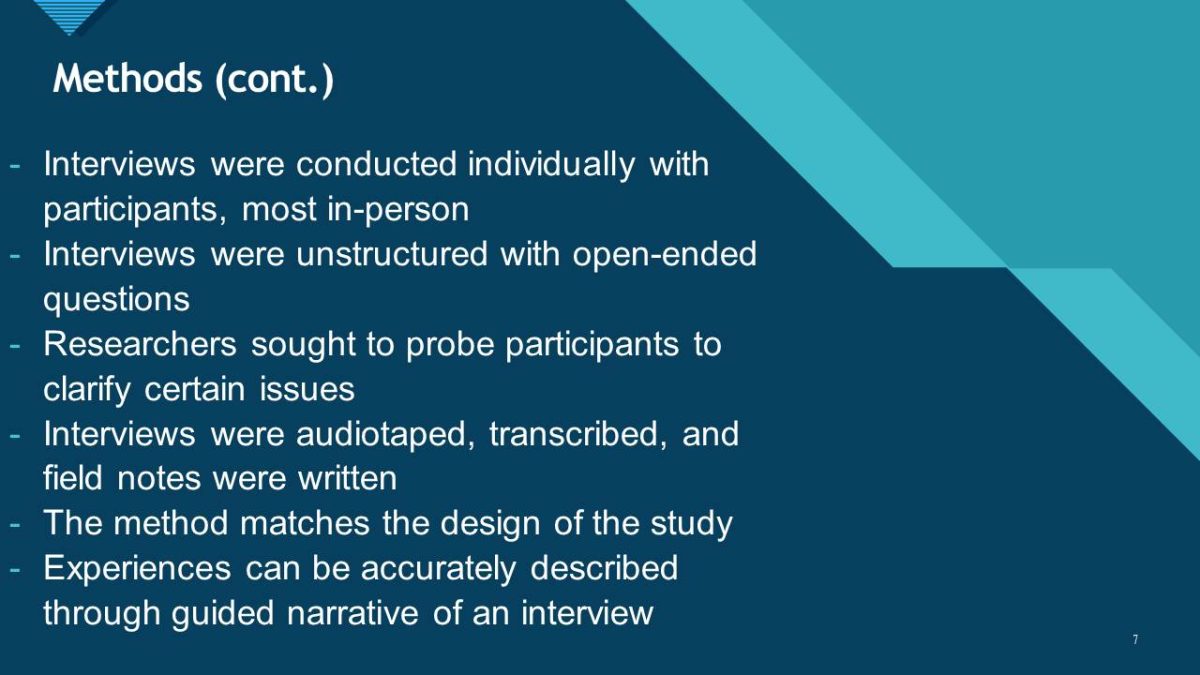
Samples
- Researchers indicate the use of purposive sampling – no reason given;
- Recruitment was conducted through social networks and participant referrals;
- Sampling appropriate given the qualitative and subjective nature of the study and had to consider mental health issues;
- Sampling had to follow relatively specific inclusion criteria and avoid general exclusion aspects that were listed;
- Setting of the study is not identified in any manner other participants and their spouses had to reside in the United States;
- Sample size very small – 14.
Other than a lack of description for the setting, the sampling technique is appropriate for this type of research. The inclusion and exclusion criteria determined by the researchers are important in determining the proper participants while also following ethical guidelines and excluding those for whom this type of research may be traumatic.
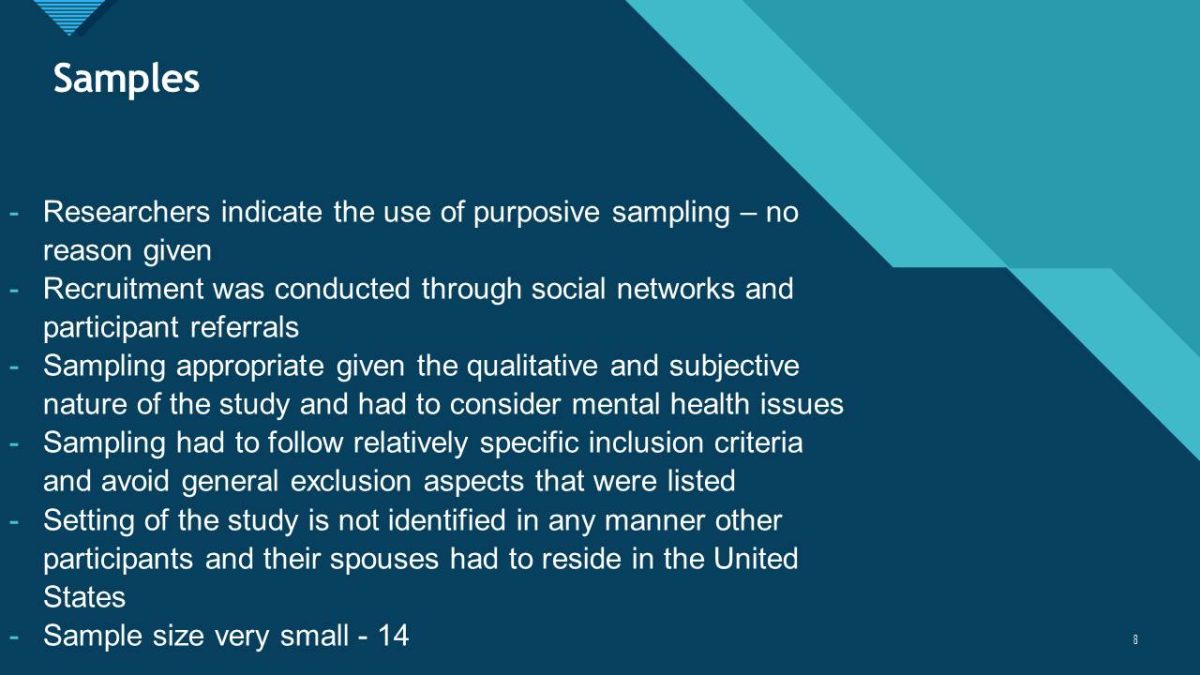
Analysis
- Use of qualitative data management software – ATLAS.ti;
- Implemented Colaizzi’s phenomenological analysis;
- This method ensured that findings accurately described experiences of participants;
- Therefore, the method prevented bias from researchers;
- Researchers noted four major themes that indicated transition of veterans.
Data analysis is described briefly. While Colaizzi’s analysis is not commonly used, it is effective in this case in decreasing bias and ensuring experiences are properly relayed. Other potential analyses could have been performed such as thematic analysis. Coding is mentioned briefly but not elaborated upon. It is unclear how the data management software itself was used. The four themes identified included: recognizing veteran is a different person, living with unpredictability, bearing the burden, and creating a new life.
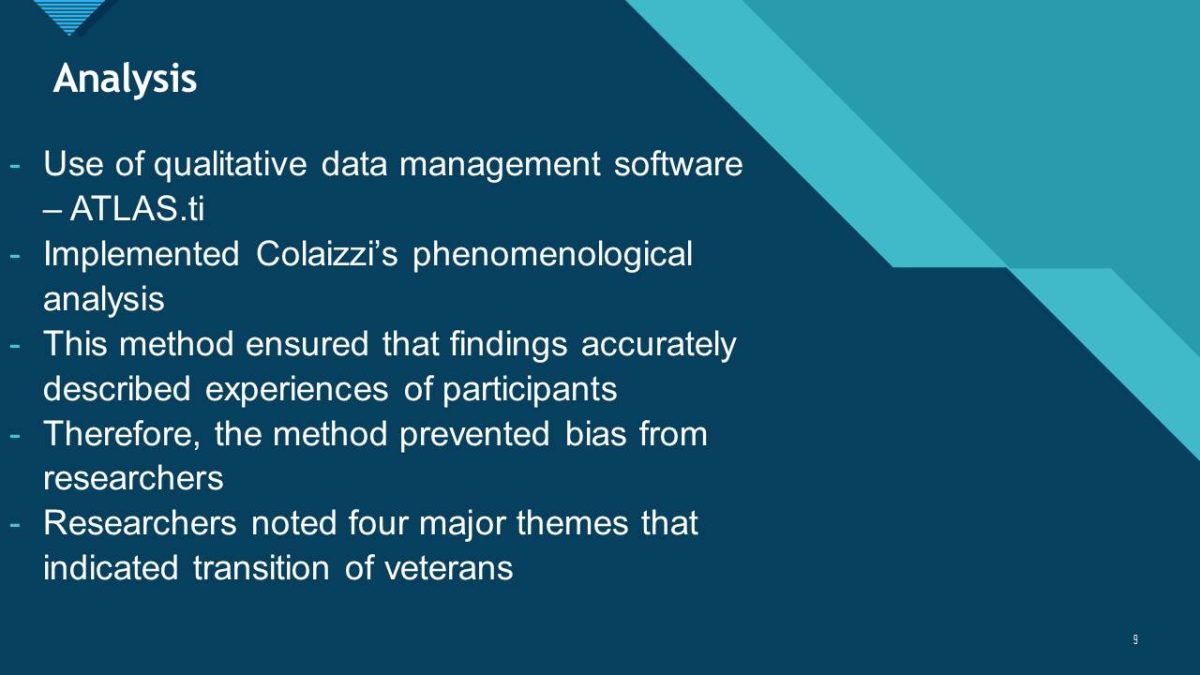
Results/Discussion
- The four previously mentioned themes are identified, each with their own subthemes that describe specific behaviors undertaken by spouses and families.
- The discussion goes on to elaborate on the research questions regarding how spouses are not prepared to deal with their husband’s PTSD or TBI (Yambo et al., 2016).
- The researchers mention how their study relates to other few qualitative studies on the topic of military spouses living with veterans with PTSD and how the research contributes to the literature.
- The researchers note only one limitation in that all participants were female spouses with male veterans and not vice versa, thus findings not generalizable.
The findings are very well described and discussed, with a strong emphasis on comparing and contrasting said findings to other research both directly and related to the topic from historic and modern conflicts. There is a strong discussion regarding both the practical living conditions and experiences as well as the emotional states of both spouses. It is strange that no other limitations in methodology or analysis were discussed. While the mentioned limitation is viable, there are others such as a small sample size, potential effect of researchers on subject responses, and skills of the researchers which may not be mental health professionals (Anderson, 2010).
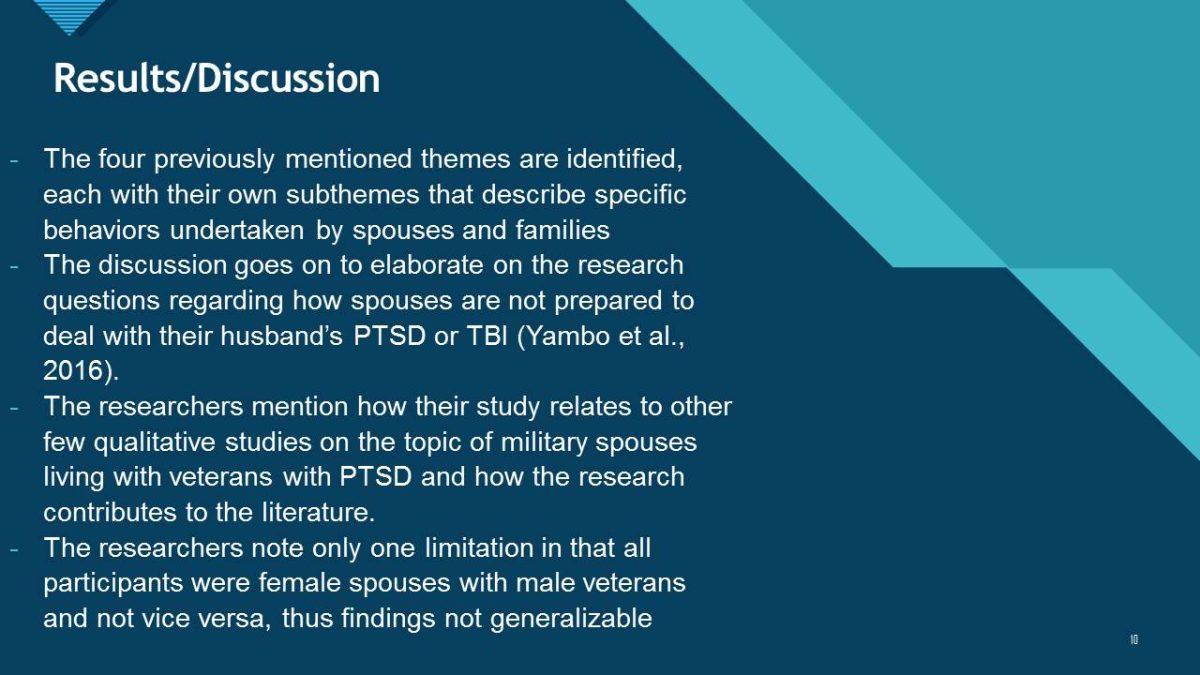
Summary Assessment
- Spouses living with PTSD veterans are unprepared and struggling to deal with issues that their husbands experience.
- The families undergo key stages, each with challenges in behavior and adaptation, but can eventually transition to a newer healthy life.
- For clinical nursing practice this indicates that greater attention and support should be given to mental health for diagnosed PTSD and TBI patients.
- Other than some questionable choices in analysis by researchers, study seems trustworthy.
- The study is valid but not highly generalizable.
- Evidence of transferability as the fundamentals on the topic are well-established along with a strong theoretical base and thematical discussions.
The study contributes significantly to a poorly researched topic. Further expanding on the clinical practice issue, it further emphasizes that all family members may be affected by PTSD, and it is through the support of spouses that the veteran can aim towards recovery, but the spouses require guidance and information as well. Overall, the study is comprehensible and very detailed in many aspects, with its validity not being questionable, but it is not generalizable due to sampling and methodological elements.
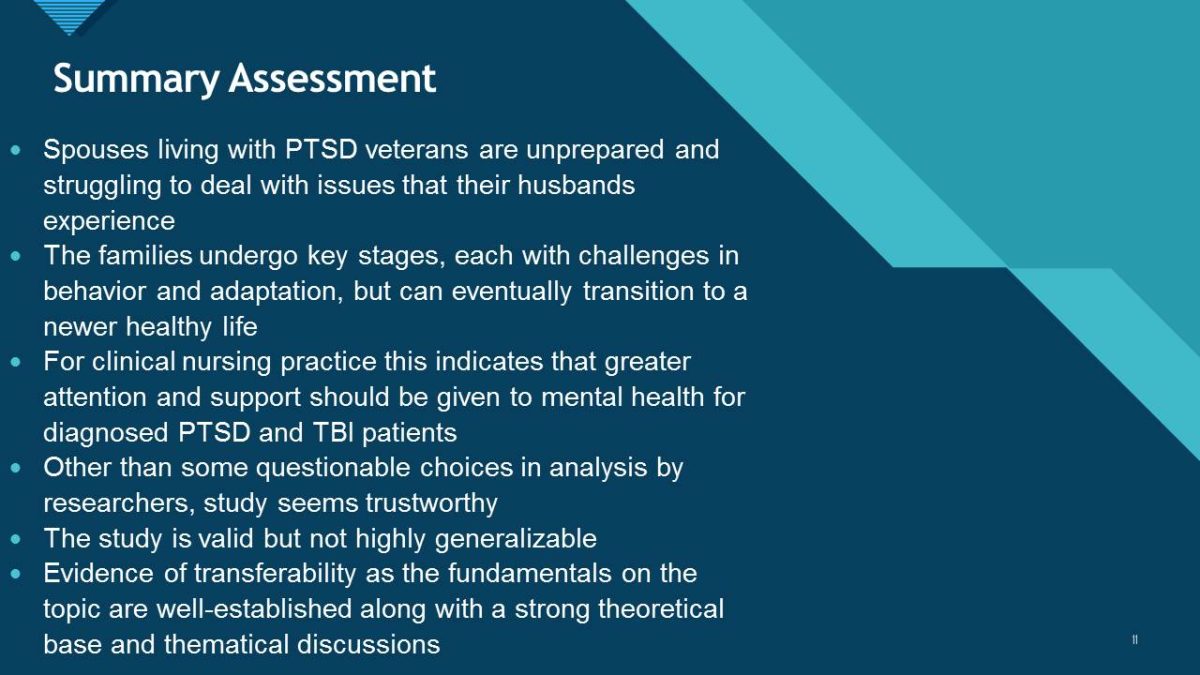
References
Anderson, C. (2010). Presenting and evaluating qualitative research. AmericanJournal of Pharmaceutical Education, 74(8), 141. Web.
Types of abstracts. (n.d.). Web.
Yambo, T. W., Johnson, M. E., Delaney, K. R., Hamilton, R., Miller, A. M., & York, J. A. (2016). Experiences of military spouses of veterans with combat-related posttraumatic stress disorder. Journal of Nursing Scholarship, 48(6), 543–551.